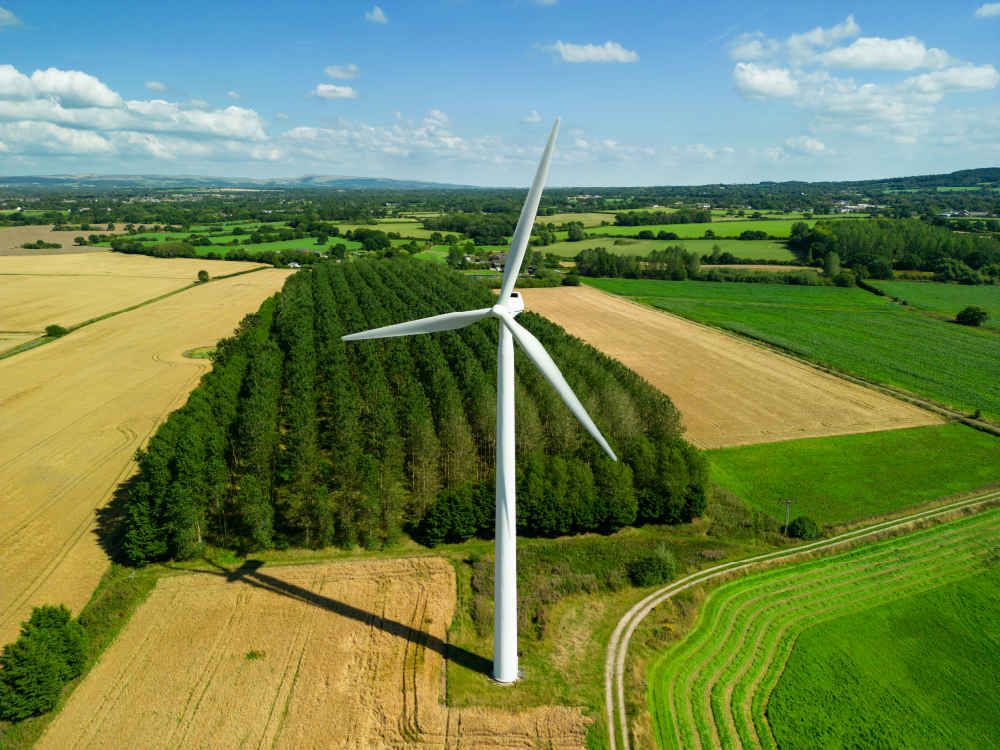
The new Labour government has wasted no time in making positive announcements around renewable energy, with Chancellor Rachel Reeves removing the de facto ban on onshore wind with a swiftly issued policy document after her maiden speech in the role.
Head of Sustainable Energy, Darren Edwards and Head of Planning, Sarah DeRenzy-Tomson, explain that while this is an excellent development for the onshore wind market after years of dormancy, Labour’s commitment to doubling onshore wind energy by 2030 may be overly optimistic:
“Onshore wind remains one of the cheapest and effective ways to generate renewable energy in the UK, yet there have only been a handful of new developments built in the last 10 years due to the effective ban on new projects issued by the Conservative government in 2015.
“The ‘ban’ essentially allowed one dissenting voice in the community to be enough to stop a development at the planning stage, as such the market did not bring new sites forward as they risked being refused at committee.
“Now these clauses in the NPPF have been removed, the market suddenly has the freedom it needs to get moving again.
“It’s great to see that the new Labour government has this at the forefront of its mind to help the country achieve net zero and should be welcomed. It will also help farmers and landowners to potentially secure a reliable source of rental income in a post-BPS landscape.
“However, there will be serious challenges ahead for Labour if it is to meet its ambitious goal of doubling onshore projects by 2030.
“One point is that much of the talented workforce in the onshore wind market have not been sat on their hands waiting for the ban to be revoked. Many have moved into other areas like solar, offshore wind, projects on the continent or changed careers entirely. Fisher German has retained this expertise in house and are excited that this market is to be re-invigorated.
“We expect the market to respond relatively quickly, but there is likely to be an initial delay in getting the expertise back in the right place.
“Secondly, while the ban is now gone, the planning process remains lengthy. While Rachel Reeves’ announcement around beating the planning backlog with extra funding is to be welcomed, it does not change the fact that a series of hoops need to be jumped through before onshore sites can be built.
“Finally, a lack of grid capacity and inadequate infrastructure could also slow things down. National Grid is currently quoting lead times well into the 2030's for large solar and battery projects and while the generating profile for onshore wind is very different, substantial investment will need to be made into both the transmission and distribution networks for new onshore wind.
“That said, the removal of the ban is just the first announcement of several Labour is planning to make. A consultation on the NPPF is set to follow, and potential for larger-scale onshore wind to be incorporated into the NSIP process which would make onshore wind farms a national decision rather than a local decision.
“The fact that Labour has acted so quickly to enable onshore wind to be considered as other developments through the planning system once again is the most important thing for the market, and projects will certainly come forward as a result.
“Our expert in-house team with specialisms across sustainable energy, planning, and rural matters are best placed to advise farmers or landowners looking to take advantage of Labour’s long-overdue announcement.”
Find out more about our planning consultancy services and our green energy and consultancy services.





